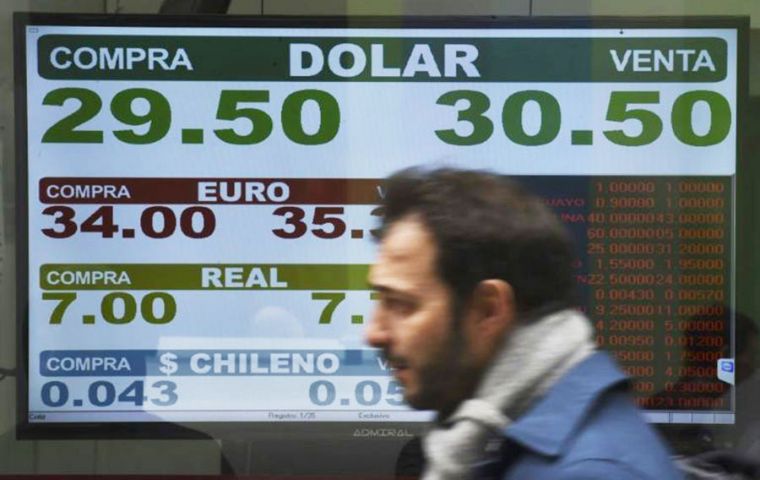MercoPress. South Atlantic News Agency
Argentine Peso stabilizes, country risk falls and stock market rebounds
 At the end of trading, the US dollar which earlier was selling at over 30 Argentine Pesos, ended some 30 cents lower at an average 29.61 Pesos
At the end of trading, the US dollar which earlier was selling at over 30 Argentine Pesos, ended some 30 cents lower at an average 29.61 Pesos The Argentine peso climbed on Tuesday after the Central bank implemented a raft of measures to stabilize the volatile currency on Monday, including increasing the benchmark interest rate to 45% from 40% previously, and announcing it was offering markets US$ 500 million.
At the end of trading, the US dollar which earlier was selling at over 30 Argentine Pesos, ended some 30 cents lower at an average 29.61 Pesos. Anyhow the market was nervous and volatile.
Likewise of the US$ 500 million dollars made available, the central bank finally awarded some US$ 200 million, also helping to decompress markets.
In the stock exchange the Merval indicator rebounded 1.8% reaching 26.536 units, in line with other emerging markets as the Turkish Lira after a three-week drubbing, pulled out of a nosedive following on a raft of measures and announcements from Ankara's finance minister sought to reassure investors.
Economist Gustavo Ber said that global relief in emerging markets was immediately taken advantage by Argentine domestic assets eager to recover after the bashing from previous days, even when investors are expecting the implementation of more severe measures to normalize the country risk index, which is considered crucial to recuperate external financing. On Monday the Merval had plummeted 3%.
Argentina's sovereign debt risk also recovered on Tuesday falling by 52 points, almost 7%, to 696. Nevertheless the level is well beyond normal and closer to February 2015 levels.
On Monday the country risk had ballooned 6,9% to 748 points as a consequence of the ongoing probe into corruption involving ex officials and the leading public works contractors, during the Kirchner couple years in government.
Overall Latin American equities mounted a second day of a comeback on Tuesday as the region shook off the impact of panic selling in Turkey's lira, while the currencies of Mexico and Brazil rebounded.
Brazil's real and Mexico peso both rose sharply alongside the Turkish Lira, but currencies in Colombia, Peru, and Chile all slipped.
“A return to volatility cannot be ruled out if the Turkish lira starts losing against the dollar again,” Mexico's Banco BASE said in a note to clients.
Brazil's benchmark Bovespa index climbed 1.4% while Mexico's S&P/BMV IPC rose 0.67%.




Top Comments
Disclaimer & comment rules-

-

-

Read all commentsReekio,
Aug 16th, 2018 - 06:03 pm +1“At this moment, however, the country has zero tools to slow down speculative movements, after all regulations controlling incoming and outgoing capitals were dismantled.”
Just curious, what tools does it need?
“Ah, the virtues of the free market!”
Yes, it can be a rollercoaster ride but there is a swings and roundabouts effect that can even out the fluctuations somewhat.
High interest rates = Bad for your loans and credit cards, good for your savings.
Low interest rates = Good for your loans and credit cards, bad for your savings.
High currency value = Bad for exports, good for imports.
Low currency value = Good for exports, bad for imports.
Etc.
So you've got to hope that Argentina will settle down to a balanced system that works out best for most and the free market should cause some of these factors to be self-correcting. However, some management may also be required and you are claiming that Argentina has “zero tools” to do that. And yet, the MP article says the central bank made some changes that improved things. Sounds to me like they did indeed have at least one tool and they used it to good effect!
Only in Reekieland does good news = bad news.
The challenge of Argentina is cutting expenditures and taxes to sustainable levels so as to cut high levels of foreign indebtness and attract much needed foreign investment, but in the process the State must not neglect to invest in education, infraestructure and R&D (for once we agree on a little something EM - R&D is important!). That should already be challenging enough, but with the Senate controlled by the Peronists and the usual union mobsters eager for blood this will be twice the challenge. Larger cuts in expenditure should have come earlier, now entering an electoral year it will be much more difficult. At least many Argentines seem to recognize the challenge and problems this time around - The financial literacy of our society seems to be improving.
Aug 19th, 2018 - 03:47 am +1What then is required to make Argentina succeed?
Aug 17th, 2018 - 02:24 pm 0Based on your independent analysis and past experience.
Commenting for this story is now closed.
If you have a Facebook account, become a fan and comment on our Facebook Page!